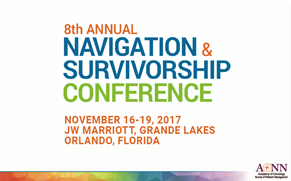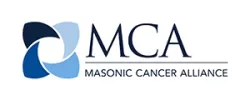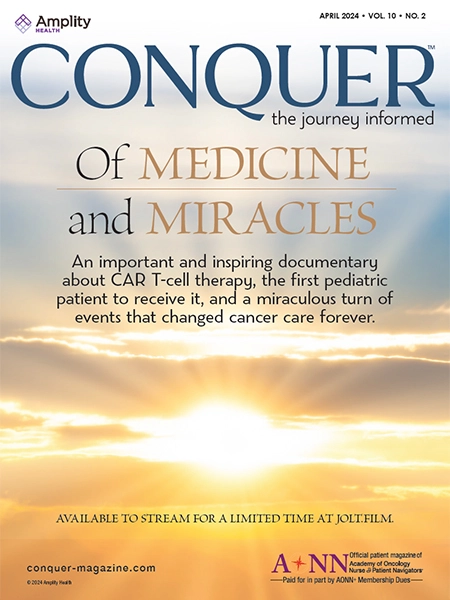
On Thursday, AONN+ welcomed more than 1,000 nurse and patient navigators to the JW Marriott, Grande Lakes, in sunny Orlando, Florida, for our Eighth Annual Navigation & Survivorship Conference. This is a much-anticipated event for our leadership and members, and this year’s conference promises to be our best yet! Over the next few days, attendees will delve into some of the hottest topics in navigation and cancer treatment. Of course, there will also be plenty of networking, fun, and recognition, including revealing the recipient of this year’s Hero of Hope® Patient Award and Oncology Nurse Excellence™ (ONE) Award winners!
Certification Exams Draw Aspiring ONN-CGs, OPN-CGs
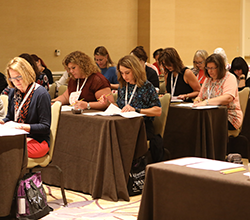
The day began bright and early for the first wave of attendees taking part in this year’s Oncology Nurse Navigator‒Certified Generalist™ (ONN-CG™) and Oncology Patient Navigator‒Certified Generalist™ (OPN-CG™) certification exams. These are the industry’s first certifications specifically for navigators, and AONN+ is honored to be setting the standard in this area. Another round of certification exams will be given at the 2018 AONN+ Midyear Conference in May.
Committee Workshop Meetings
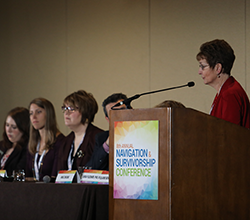
These workshops offered members of the Evidence into Practice (EIP), Survivorship, and Technology committees the opportunity to delve into some of the pressing issues and challenges that navigators face in their day-to-day activities.
Administrative engagement was the focus of the EIP Committee’s workshop, which was led by Danelle Johnston, RN, MSN, ONN-CG, OCN, CBCN, Chief Nursing Officer, Senior Director of Strategic Planning and Initiatives, The Lynx Group; Sandra Walters, RN, CBCN, ONN-CG, Breast Navigator, St. Joseph Hospital; and Tricia Strusowski, MS, RN, Manager, Oncology Solutions, LLC. During this session, participants shared the barriers and challenges that they experience when getting administrators to understand their role and the value that they bring to the organization. They then talked about AONN+’s standardized metrics for patient experience, clinical outcomes, and return on investment. The workshop wrapped up with a review and discussion of the evidence-based tools that navigators can use to facilitate engagement with their administrators.
Jennifer R. Klemp, PhD, MPH, MA, Associate Professor of Medicine, Division of Clinical Oncology, Director, Cancer Survivorship, Co-Program Leader, Cancer Prevention and Survivorship, University of Kansas Cancer Center, and Founder/CEO, Cancer Survivorship Training, Inc., opened with an overview of the session before introducing Staci K. Oertle, RN, MSN, APN, AOCNP, Nurse Practitioner, MD Anderson Cancer Center at Cooper. Staci kicked off the Survivorship Committee’s workshop with a refresher on survivorship, the various practice models, and the elements of a survivorship care plan. Jodi Stoner, APRN, ACNS-BC, MSN, Survivorship Program Coordinator, OSF HealthCare Saint Francis Medical Center, followed with a look at her organization’s survivorship process. She shared when survivorship is discussed with patients as well as barriers to the survivorship process, including patient “no shows,” lack of funding, and EMRs that don’t speak to one another. Jennifer closed the session with a look at challenges to meeting national accreditation standards surrounding survivorship care planning.
Technology Committee Co-Chair Linda Fleisher, PhD, MPH, Senior Scientist, Children’s Hospital of Philadelphia and Fox Chase Cancer Center, opened with an overview of AONN+’s newest committee, its charge, current membership, and goals. She also shared some of the member feedback that AONN+ has received regarding technology. Elaine Sein, RN, BSN, CBCN, Consultant, Retired Senior Project Manager, Fox Chase Cancer Center, followed with an update on the AONN+ Metrics Task Force. Attendees then participated in a panel discussion about how technology can support patient navigation. Before taking questions from the audience, participants provided a brief overview of their organization. These included:
- Brook Blackmore, MSN, RN, Navigation Director, National Group
- Lisa Hartman, MA, BSEd, BSN, Director of Navigation Training and Education, Sarah Cannon
- Carrie S. Tilley, MS, ANP-BC, AOCNP, Caregiver
- Heather Hollen, Director, Education, Cancer Support Community
- Melissa Jenkins, Community Manager, Breastcancer.org
- Leslie R. Schover, PhD, Founder, Will2Love, LLC
Oncology Nurse Excellence™ (ONE) Award/Opening Remarks
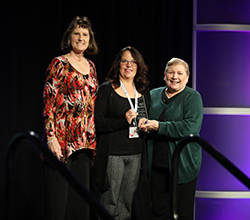
The Eighth Annual Navigation & Survivorship Conference officially kicked off with a warm welcome from Lillie D. Shockney, RN, BS, MAS, ONN-CG, Director and Co-Founder of AONN+, and Sharon Gentry, RN, MSN, CBCN, AOCN, ONN-CG, AONN+ Leadership Council. During their brief presentation, Lillie and Sharon provided teasers for what guests could anticipate over the next 3 days before segueing into one of the highlights of the meeting—the announcement of the 2017 Oncology Nurse Excellence™ (ONE) Award winner. This year, the honor belongs to Laura Mulderrig, BSN, RN, OCN, a nurse in the clinical research unit at Fox Chase Cancer Center in Philadelphia, Pennsylvania.
Patient Care Connect: The Real-World Experience of Navigation within the Oncology Care Model
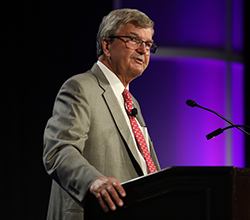
Edward E. Partridge, MD, Director Emeritus, University of Alabama at Birmingham (UAB) Comprehensive Cancer Center, and Chief Medical Officer, Guideway Care, Birmingham, kicked off the day’s sessions with an insightful and in-depth look at how lay navigators at UAB can help improve quality and reduce the cost of care. His presentation focused on UAB’s involvement in the federally funded Patient Care Connect program, which challenged participating organizations to develop innovative healthcare delivery models that improve health, advance care, and lower cost. This is also known as the Triple Aim.
UAB’s delivery model focused on the use of lay navigators, who empowered patients through education, encouraged them to take an active role in their healthcare, helped to eliminate barriers, and ensured timely delivery of care. Over the 3 years during which the program was in place, UAB’s navigators had more than 88,000 patient contacts. Their efforts ultimately helped to reduce the health system’s total cost to Medicare by $19 million.
Dr. Partridge then transitioned to the various payment models that exist within the market, focusing on the 3 alternative models that will eventually take the place of the fee-for-service model. These include: Medicare’s Oncology Care Model, VIVA’s Oncology Care Model Collaborator, and BCBS of Alabama’s Patient-Centered Oncology Payment. After these, there are bundled payments.
Of these models, Dr. Partridge said the following: “In a fee-for-service model, a navigator is a problem for administrators who must figure out how to pay for this service. In the 3 alternative payment models and bundled payments, the navigator is critical. Once we can get out of fee-for-service and into these other models, navigation is here to stay.”
Financial Navigation
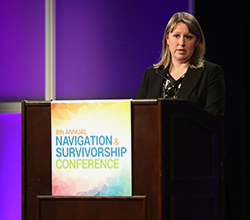
Financial toxicity is an unfortunate side effect of a cancer diagnosis, and one that is potentially avoidable with education and the proper support. During the first portion of this presentation, Stephanie Merce Boecher, RN, OCN, MSN, BSN, BA, Director of Oncology & Neuroscience Services, Advocate Sherman Hospital Cancer Center, delved into the reasons for this problem, which can include unforeseen out-of-pocket medical costs, loss of earnings, and limited or no insurance coverage, as well as the red flags that signal a financial problem.
Rachel Faustner, BS, Oncology Financial Navigator, Advocate Sherman Hospital Cancer Center, then took the stage to explain what a financial navigation program is, and how it can help patients overcome financial challenges related to their diagnoses. She shared some of the programs and resources that Advocate Sherman Hospital Cancer Center uses to cut the cost of cancer care for patients, and provided case studies to illustrate how she might leverage these. As a result of these efforts, Rachel explained that her organization was able to save patients in the program an average of $1.6 million each in 2016 and nearly $1 million so far this year.
After enjoying a Dinner N.E.X.T. Day Track entitled A Treatment Option for Patients with HR+/HER2‒ Advanced or Metastatic Breast Cancer and sponsored by Lilly Oncology, guests had the opportunity to unwind and catch up with colleagues and friends, both old and new, during an end-of-day networking event.

